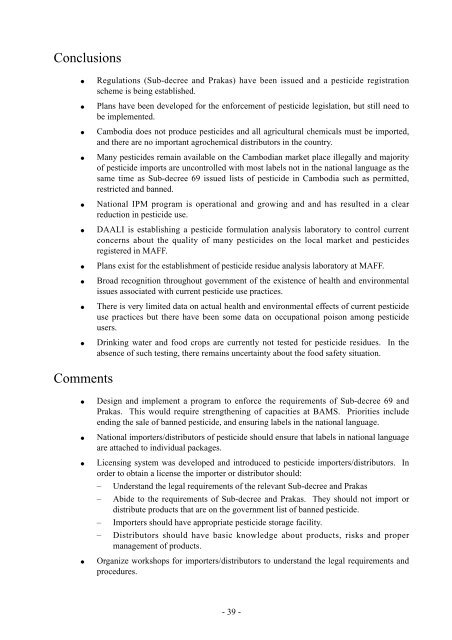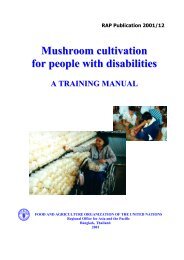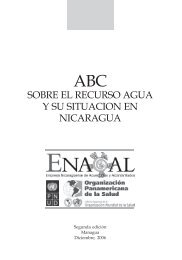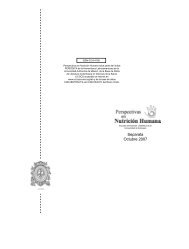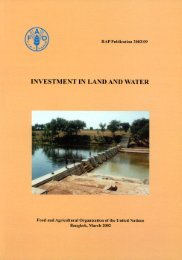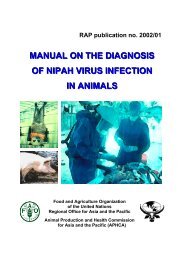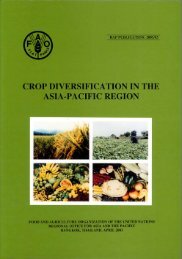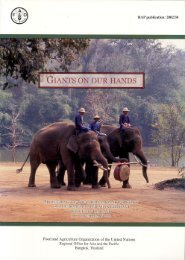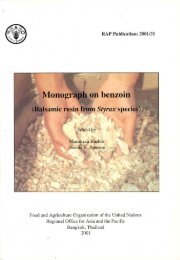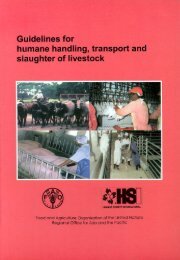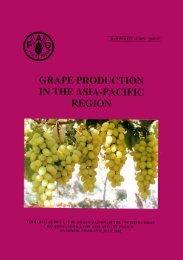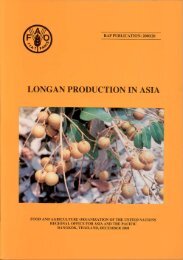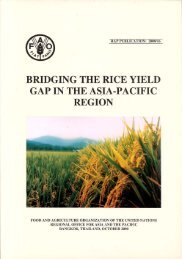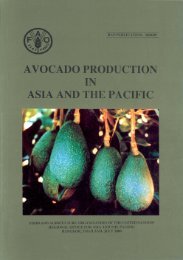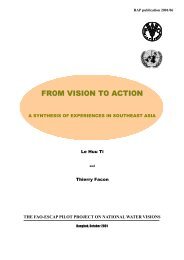Proceedings of the Asia regional workshop on the
Proceedings of the Asia regional workshop on the
Proceedings of the Asia regional workshop on the
Create successful ePaper yourself
Turn your PDF publications into a flip-book with our unique Google optimized e-Paper software.
C<strong>on</strong>clusi<strong>on</strong>s<br />
● Regulati<strong>on</strong>s (Sub-decree and Prakas) have been issued and a pesticide registrati<strong>on</strong><br />
scheme is being established.<br />
● Plans have been developed for <str<strong>on</strong>g>the</str<strong>on</strong>g> enforcement <str<strong>on</strong>g>of</str<strong>on</strong>g> pesticide legislati<strong>on</strong>, but still need to<br />
be implemented.<br />
● Cambodia does not produce pesticides and all agricultural chemicals must be imported,<br />
and <str<strong>on</strong>g>the</str<strong>on</strong>g>re are no important agrochemical distributors in <str<strong>on</strong>g>the</str<strong>on</strong>g> country.<br />
● Many pesticides remain available <strong>on</strong> <str<strong>on</strong>g>the</str<strong>on</strong>g> Cambodian market place illegally and majority<br />
<str<strong>on</strong>g>of</str<strong>on</strong>g> pesticide imports are unc<strong>on</strong>trolled with most labels not in <str<strong>on</strong>g>the</str<strong>on</strong>g> nati<strong>on</strong>al language as <str<strong>on</strong>g>the</str<strong>on</strong>g><br />
same time as Sub-decree 69 issued lists <str<strong>on</strong>g>of</str<strong>on</strong>g> pesticide in Cambodia such as permitted,<br />
restricted and banned.<br />
● Nati<strong>on</strong>al IPM program is operati<strong>on</strong>al and growing and and has resulted in a clear<br />
reducti<strong>on</strong> in pesticide use.<br />
● DAALI is establishing a pesticide formulati<strong>on</strong> analysis laboratory to c<strong>on</strong>trol current<br />
c<strong>on</strong>cerns about <str<strong>on</strong>g>the</str<strong>on</strong>g> quality <str<strong>on</strong>g>of</str<strong>on</strong>g> many pesticides <strong>on</strong> <str<strong>on</strong>g>the</str<strong>on</strong>g> local market and pesticides<br />
registered in MAFF.<br />
● Plans exist for <str<strong>on</strong>g>the</str<strong>on</strong>g> establishment <str<strong>on</strong>g>of</str<strong>on</strong>g> pesticide residue analysis laboratory at MAFF.<br />
● Broad recogniti<strong>on</strong> throughout government <str<strong>on</strong>g>of</str<strong>on</strong>g> <str<strong>on</strong>g>the</str<strong>on</strong>g> existence <str<strong>on</strong>g>of</str<strong>on</strong>g> health and envir<strong>on</strong>mental<br />
issues associated with current pesticide use practices.<br />
● There is very limited data <strong>on</strong> actual health and envir<strong>on</strong>mental effects <str<strong>on</strong>g>of</str<strong>on</strong>g> current pesticide<br />
use practices but <str<strong>on</strong>g>the</str<strong>on</strong>g>re have been some data <strong>on</strong> occupati<strong>on</strong>al pois<strong>on</strong> am<strong>on</strong>g pesticide<br />
users.<br />
● Drinking water and food crops are currently not tested for pesticide residues. In <str<strong>on</strong>g>the</str<strong>on</strong>g><br />
absence <str<strong>on</strong>g>of</str<strong>on</strong>g> such testing, <str<strong>on</strong>g>the</str<strong>on</strong>g>re remains uncertainty about <str<strong>on</strong>g>the</str<strong>on</strong>g> food safety situati<strong>on</strong>.<br />
Comments<br />
● Design and implement a program to enforce <str<strong>on</strong>g>the</str<strong>on</strong>g> requirements <str<strong>on</strong>g>of</str<strong>on</strong>g> Sub-decree 69 and<br />
Prakas. This would require streng<str<strong>on</strong>g>the</str<strong>on</strong>g>ning <str<strong>on</strong>g>of</str<strong>on</strong>g> capacities at BAMS. Priorities include<br />
ending <str<strong>on</strong>g>the</str<strong>on</strong>g> sale <str<strong>on</strong>g>of</str<strong>on</strong>g> banned pesticide, and ensuring labels in <str<strong>on</strong>g>the</str<strong>on</strong>g> nati<strong>on</strong>al language.<br />
● Nati<strong>on</strong>al importers/distributors <str<strong>on</strong>g>of</str<strong>on</strong>g> pesticide should ensure that labels in nati<strong>on</strong>al language<br />
are attached to individual packages.<br />
● Licensing system was developed and introduced to pesticide importers/distributors. In<br />
order to obtain a license <str<strong>on</strong>g>the</str<strong>on</strong>g> importer or distributor should:<br />
– Understand <str<strong>on</strong>g>the</str<strong>on</strong>g> legal requirements <str<strong>on</strong>g>of</str<strong>on</strong>g> <str<strong>on</strong>g>the</str<strong>on</strong>g> relevant Sub-decree and Prakas<br />
– Abide to <str<strong>on</strong>g>the</str<strong>on</strong>g> requirements <str<strong>on</strong>g>of</str<strong>on</strong>g> Sub-decree and Prakas. They should not import or<br />
distribute products that are <strong>on</strong> <str<strong>on</strong>g>the</str<strong>on</strong>g> government list <str<strong>on</strong>g>of</str<strong>on</strong>g> banned pesticide.<br />
– Importers should have appropriate pesticide storage facility.<br />
– Distributors should have basic knowledge about products, risks and proper<br />
management <str<strong>on</strong>g>of</str<strong>on</strong>g> products.<br />
● Organize <str<strong>on</strong>g>workshop</str<strong>on</strong>g>s for importers/distributors to understand <str<strong>on</strong>g>the</str<strong>on</strong>g> legal requirements and<br />
procedures.<br />
- 39 -


